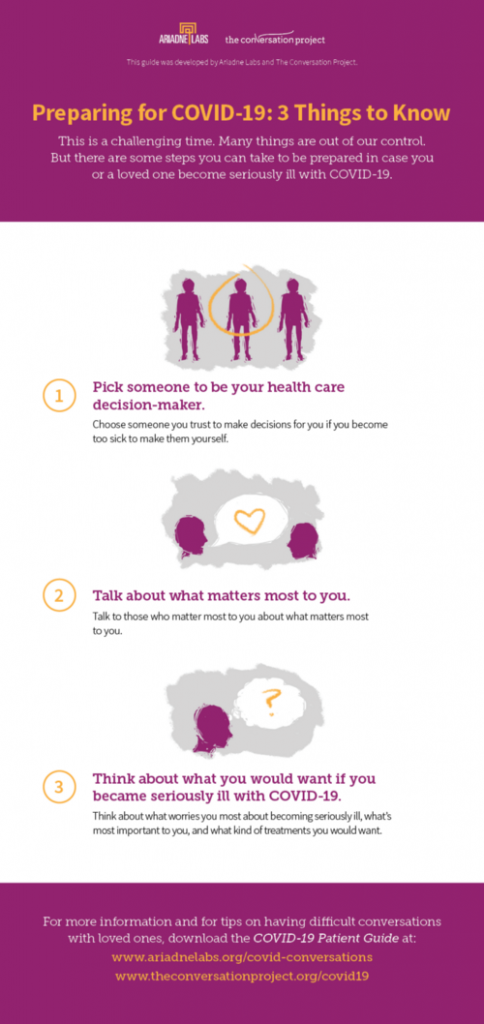By Erik K. Fromme, MD
“I have to confess my first reaction was one of shock,” said my patient Amy, who has a rare, debilitating blood cancer that also affects her nervous system, “It took me by surprise to be honest.” I had just shared information with her about how COVID-19 could affect people who, like her, already have an illness that is both life-threatening and seriously impacts their quality of life and ability to function in the world.
As a physician who cares for patients with serious illnesses, I’ve struggled to find clear, concise, and perhaps most importantly, kind ways to help my patients understand the COVID-19 pandemic so that they take effective action despite all the uncertainty and things we can’t control.
The good news is that the majority of COVID-19 patients will recover on their own, without needing intensive medical care. But for some, 5 to 10%, a COVID-19 infection could trigger Acute Respiratory Distress Syndrome (ARDS). In this syndrome the virus causes the person’s immune system to damage the lungs, which become stiff and fill with fluid. When this happens, people can’t breathe on their own and require use of a breathing machine, called a ventilator.
For patients who are already seriously ill and then get COVID-19, the risk of developing Acute Respiratory Distress Syndrome is higher and the outcomes are worse…It’s hard news to hear, but hopefully hearing it crystallizes the importance of staying home, avoiding gatherings, and scrupulously following all the guidelines.
Many people with COVID-19 Acute Respiratory Distress Syndrome recover, although it may take weeks or months on the ventilator and a lengthy rehabilitation to regain quality of life and return home. For patients who are already seriously ill and then get COVID-19, the risk of developing ARDS is higher and the outcomes are worse. Most will die with or without intensive care and those who survive may yet die of something else or may not be able to recover enough to return home. It’s hard news to hear, but hopefully hearing it crystallizes the importance of staying home, avoiding gatherings, and scrupulously following all the guidelines to avoid getting COVID-19.
Working with The Conversation Project, our team at Ariadne Labs recently completed a 2-page guide that describes three important things you can — and should — do right now to be prepared:

First, pick your person to be your health care decision maker who will advocate and make health choices on your behalf should you be unable to do so yourself. Second, gather your important people together — by phone or video call — to make sure they know what matters most to you. Third, talk to your primary care clinician.
For people who are seriously ill and are certain that they would not want intensive care, ask your clinician about completing a POLST form. That form can translate your wishes into medical orders that can be followed in an emergency. Your form can also direct health professionals to provide full treatment including a ventilator. If you can, explain WHY you want what you want. That will help your people interpret your wishes in case something arises that nobody had predicted.
The patients I’ve shared this information with have reacted differently. Several, like Amy, pointed out how hard it was to hear. On balance, they said they would rather know than not know. As one person said, “In general, knowledge is power…that said, it’s sobering — two options, bad and worse.” A young parent said, “Oh, let’s not think about that right now”.
Not every patient will make the same decision — which is why it’s crucial for every individual to identify and talk about what’s most important to them.
A patient who said he would want to try his luck with the ICU and ventilator believed that as long as his family could come visit him in a nursing facility and he could recognize them and appreciate their presence, that was enough for him.
Not every patient will make the same decision — which is why it’s crucial for every individual to identify and talk about what’s most important to them.
Here’s what Amy had to say: “Upon further thought I am realizing how important it is to provide patients with this information so they have an opportunity to make the choices that are right for them…I think you have an ethical responsibility to reach out to high-risk patients now so they can plan and thereby reduce the complexities of having these decisions made (for them) once the illness appears.”
Onward.
Dr. Erik Fromme is a Senior Scientist at Ariadne Labs’ Serious Illness Care Program, whose goal is to improve how health professionals talk to and care for their seriously ill patients, to ensure that what is important to patients remains at the center of their care.
Header illustration by Courtney Staples / Ariadne Labs



